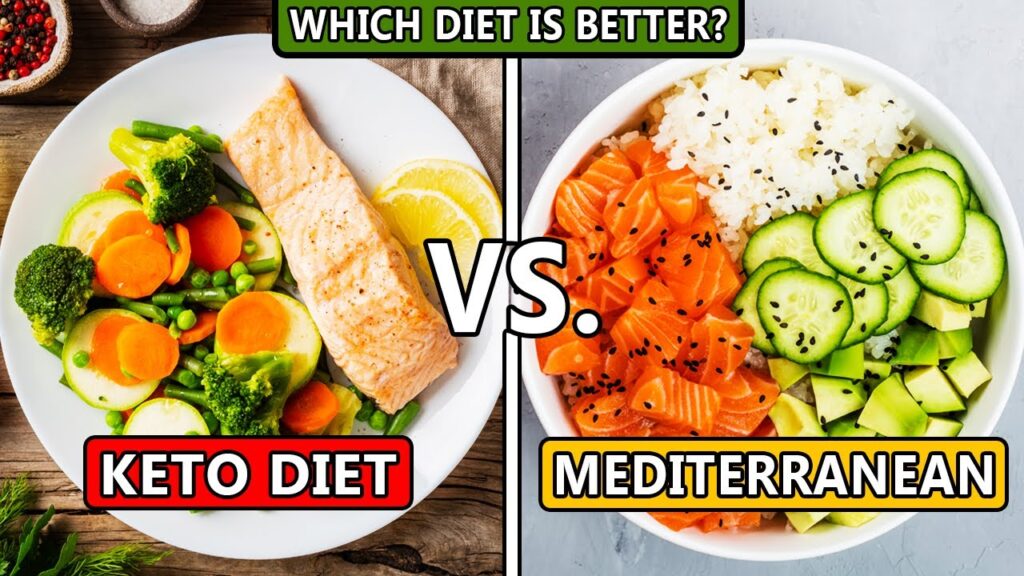
In the ever-evolving landscape of nutrition, two dietary plans often emerge as popular contenders for optimal health and weight management: the Ketogenic (Keto) Diet and the Mediterranean Diet. While both claim transformative benefits, choosing the right one depends on your health goals, lifestyle, and sustainability preferences. This article unpacks the fundamental differences between the two and examines their potential impact on your overall well-being.
Understanding the Basics
The Keto Diet is a high-fat, moderate-protein, low-carbohydrate dietary regime that shifts the body into a metabolic state called ketosis. In ketosis, the body burns fat for energy instead of carbohydrates. The typical macronutrient ratio in a keto diet is about 70-75% fat, 20-25% protein, and 5-10% carbohydrates.
On the other hand, the Mediterranean Diet emphasizes whole foods such as fruits, vegetables, whole grains, legumes, nuts, seeds, fish, and olive oil. It allows moderate wine consumption and encourages social eating. Unlike keto, it doesn’t drastically restrict any macronutrient but focuses on balance and variety.
Health Benefits Compared
Both diets boast scientifically-backed health advantages, but their mechanisms and long-term effects differ.
Keto Diet Benefits:
- Rapid Weight Loss: The body quickly sheds water weight due to carbohydrate restriction and enters fat-burning mode.
- Improved Blood Sugar Control: Low carb intake helps stabilize blood glucose levels, making it suitable for type 2 diabetes management.
- Mental Clarity & Focus: Ketones provide a consistent energy source for the brain.
Mediterranean Diet Benefits:
- Heart Health: Rich in omega-3s and healthy fats, this diet reduces LDL cholesterol and supports cardiovascular function.
- Anti-inflammatory Properties: Due to its emphasis on fruits, vegetables, and olive oil.
- Longevity and Disease Prevention: Linked to reduced risks of Alzheimer’s, Parkinson’s, and certain cancers.
According to studies from the best pharmaceutical companies and medical institutions worldwide, the Mediterranean diet consistently ranks high in dietary assessments for overall health, whereas the keto diet is often viewed as effective in short-term therapeutic applications like epilepsy treatment or initial weight loss.
Which Diet is More Sustainable?
Sustainability is crucial when evaluating any dietary plan.
The Keto Diet, while effective for quick results, can be challenging to maintain over time due to its restrictive nature. Constant monitoring of carbohydrate intake can lead to “keto fatigue,” and social dining may become difficult. Moreover, long-term adherence may potentially lead to nutrient deficiencies unless carefully managed.
In contrast, the Mediterranean Diet is more flexible and culturally inclusive. Its variety and balance make it easier to sustain over a lifetime. It aligns with many traditional dietary habits globally, especially in regions like Southern Europe and parts of the Middle East.
Risks and Considerations
Keto Diet Risks:
- Nutrient Deficiencies: Due to restricted fruit and whole grain intake.
- Digestive Issues: Low fiber content may lead to constipation.
- Keto Flu: Fatigue, headaches, and irritability during the initial adaptation phase.
Mediterranean Diet Risks:
- Caloric Overload: Liberal use of olive oil and nuts can contribute to excess calorie intake.
- Alcohol Consumption: Encouragement of moderate wine intake may not be suitable for all individuals.
Before adopting any diet, consulting healthcare professionals is essential. Many top health institutions and some of the best pharmaceutical companies recommend personalized nutrition based on metabolic markers, genetics, and existing health conditions.
Diet and Tech: The Digital Health Revolution
With the rise of health-conscious consumers and the integration of technology in wellness, software tools now play a pivotal role in guiding dietary decisions. From AI-driven meal planners to health tracking apps, technology developed by a software company in India or abroad is transforming the way individuals engage with their nutrition.
These innovations allow for:
- Real-time macro tracking
- Recipe suggestions based on diet preferences (Keto or Mediterranean)
- Integration with wearable devices for activity and sleep monitoring
- Personalized coaching via digital platforms
Indian software companies are contributing significantly to this digital health revolution, leveraging AI, machine learning, and cloud computing to offer tailored solutions to a global audience.
Pharmaceutical Insights
Interestingly, dietary interventions are no longer seen in isolation. The pharmaceutical industry is increasingly acknowledging the synergy between nutrition and medication. For instance, a pharma company in Germany might explore how ketogenic metabolic pathways can complement treatments for neurological disorders, while another might support the Mediterranean diet for its cardiovascular benefits.
Clinical trials and observational studies by global pharma players underscore the importance of diet in preventive medicine. Integrating dietary counseling into routine medical practice is becoming more prevalent, especially among top-tier pharma organizations.
Making the Right Choice
So, how do you choose between Keto and Mediterranean?
Opt for Keto if:
- Your primary goal is rapid weight loss
- You are managing specific medical conditions (e.g., epilepsy, insulin resistance)
- You are prepared for a highly structured, restrictive plan
Choose Mediterranean if:
- You seek long-term health and disease prevention
- You enjoy a diverse, balanced diet with social flexibility
- You prefer a lifestyle-oriented approach to eating
Ultimately, the “right” diet is one that aligns with your health goals, personal preferences, and is sustainable over the long haul. Whether it is tech-enabled nutritional tracking by a software company in India or evidence-based recommendations from the best pharmaceutical companies, the convergence of diet, technology, and medicine is shaping a healthier future.
Final Thoughts
While both Keto and Mediterranean diets offer compelling benefits, the decision rests on individual needs. With increasing support from digital platforms and a growing body of research from leading global institutions, including pharma companies in Germany, choosing a diet is no longer a one-size-fits-all proposition.
The future of health is integrative. With smart software solutions and cutting-edge pharmaceutical insights, individuals are better equipped than ever to make informed dietary choices that can enhance not just longevity, but quality of life.





